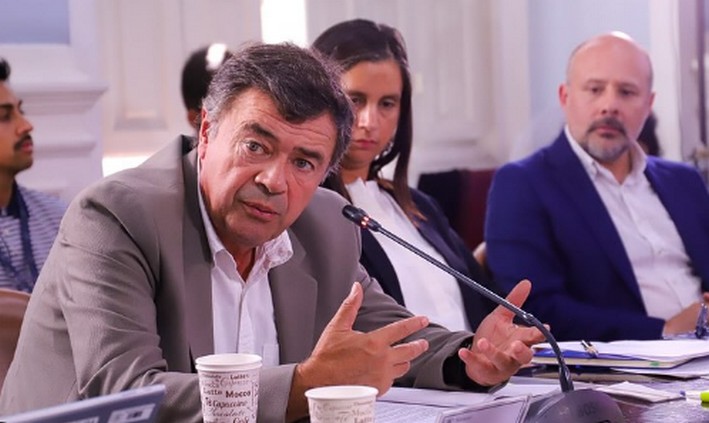- Esteban Valenzuela addressed the content of Luis Felipe Gazitúa's letter to shareholders.
The Minister of Agriculture, Esteban Valenzuela, addressed the statements made by the president of Empresas CMPC, Luis Felipe Gazitúa, who in a letter to the company's shareholders claimed to observe a "retreat of the forestry industry." This, he said, is due to the impact of forest fires, timber theft, land usurpations, and insecurity.
"It is not true that there is a retreat," stated the Secretary of State, who also noted that in the first two months of 2024, forestry exports grew by 7.5% annually to $988 million. "The main destination markets continue to be led by China and the United States, so the performance of our exports remains directly linked to the performance of those economies," Valenzuela wrote in a statement to "El Mercurio."
-The president of CMPC pointed out that while the forestry sector is growing in other countries in the region and developed nations, there has been no progress in Chile. Do you share that view?
-"I have a rather positive outlook on the future. For the Government and the ministry, the forestry sector is a fundamental pillar for rural and national development. Clearly, fires, timber theft, and other factors have created uncertainty. That is why we have established dialogue tables to discuss the future of the sector, listening to stakeholders and proposing bills that encourage responsible and sustainable practices (...) It is important to emphasize that just as the use of wood is necessary, so is its origin—meaning it must come from sustainable forest management. This implies that forest plantations must be developed with economic, social, and environmental balance, respecting the particularities of each territory and, above all, the communities."
-Is there any concrete support plan for forestry SMEs?
-"Of course, within budgetary frameworks, we have strongly promoted various initiatives aimed at involving SMEs in the housing challenge. Together with the Ministry of Housing (Minvu), Corfo, and the Biobío Regional Government (Gore), we launched the strategic program for industrialized construction, Madera Biobío, in 2022, which has allocated resources for the design of industrial wooden housing and technology prospects for SMEs. In fact, a group of 13 SME companies will travel to Canada in late April (...). Similarly, regional FIC instruments are supporting companies in digital transformation and construction technologies. Something similar has happened in Ñuble, where Corfo is supporting technological dissemination for SMEs. We have instructed the Forestry Institute to implement similar initiatives in La Araucanía, Los Lagos, and Maule."
-Is ensuring the security of forestry SMEs' woodlands key to revitalizing this sector?
-"The sector has faced mega-fires since 2017, but this Government has made progress, and I would hope that is acknowledged. The budget for CONAF (National Forestry Corporation) in fire prevention and combat has been doubled, providing more certainty and public-private collaboration to the industry, as seen in the successful fire prevention and combat season, which reduced affected areas to 70,000 hectares, compared to the five-year average of 140,000 (...). Additionally, there are different situations. In Arauco and Malleco, Sebastián Naveillán, president of Malleco's farmers, visited us and stated that this year, the decrease in attacks has been explicit and significant. Furthermore, remember that the law against timber theft was passed, helping to create a context of greater certainty and accountability for buyers regarding the origin of the wood, which has been significant."
"The Government will ensure that this year, a law promoting more forests and sustainable agroforestry is introduced, contributing to a more mixed model—what we call 70-30—where 70% can be forest plantations, but 30% would consist of firebreak zones, mitigation areas, protecting wetter zones with pastures, and combining with fruit farming, among other aspects, to aid the country's economic growth."
Source: El Mercurio







Comentarios (0)
No hay comentarios aún. ¡Sé el primero en comentar!
Deja un comentario